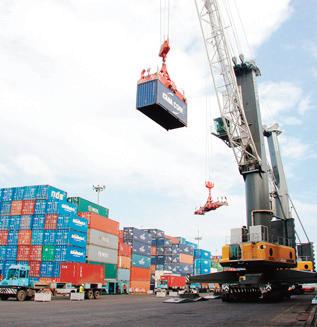
3 minute read
Africa focus
SMART TRANSPORT SOLUTIONS
The Nigeria Ports Authority (NPA) has been implementing, albeit with initial mixed results, a smart traffic planning and optimisation transport system, writes Shem Oirere
The aim is to address truck congestion and traffic gridlock at its major ports in the hope it will improve efficiency and reduce greenhouse gas emissions.
NPA, in partnership with Lagos-based Trucks Transit Parks Ltd, launched the truck electronic call up system as the ports' operator sought for “a permanent solution to the problem of truck congestion around Apapa and its environs.”
TRUCK MANAGEMENT
Apapa, also called Lagos Port, is presently one of the biggest seaports in Nigeria with five private terminals operators including AP Moller Terminal Ltd, ENL Consortium Ltd, Apapa Bulk Terminal Ltd, Greenview Development Nigeria Ltd and Lilypond Inland Container Terminal, hence the high truck traffic and associated emissions that are also linked to high energy consumption.
NPA introduced the use of a mobile application, Eto, an electronic truck call-up system designed for easy management of how trucks come to and move out of ports and also access to the ports especially Apapa and Tincan ports.
The Eto application is "responsible for the scheduling, entry and exit of all trucks into the ports with effect from 27th February 2021”, according to Ibrahim S. Nasiru Assistant General Manager Corporate &Strategic Communications at NPA.
NPA had earlier converted the Lilypond Container Terminal into a holding bay for trucks to support the holding of trucks until they are called up to deliver or pick cargo at the port through the Eto app.
With the introduction of the new system all transporters, trucks owners and truck drivers will be required to download the Eto App before the commencement date to enable them register accordingly.
Cargo owners are required to return empty containers to the ports through the approved holding bays operated by shipping companies that must be using the Eto Platform.
The shipping company will then move empty containers from their holding bay to the port after making necessary bookings on the Eto platform to return empty containers to the port.
REDUCED EMISSIONS
This new project, NPA says “will bring order and sanity to the ports access roads,” but it requires transporters, truck drivers, cargo owners, clearing agents shipping companies and all port users to work in cooperation with the port authority.
“Non-compliance to the use of Eto and its guidelines will result in denial of access into the ports, impounding of trucks and withdrawal of registration/operating license,” warns NPA
in a statement in February 2021. In addition to improving the movement of cargo to and from the ports of Nigeria, the e-truck call system will contribute substantially to reducing total carbon emissions from trucks and rubber tyred gantry cranes, including those by the five container terminal operators.
The high number of external cargo trucks entering the NPA owned ports is likely to surge in response to the growth of Nigeria's maritime industry.
In fact, in the first half of 2019 an estimated 4,420 ships called at the Nigerian ports including carriers for petroleum and gas, liquefied natural gas, dry bulk and container ships.
Moreover, Nigeria imports via the sea rose from US$44, 700 million in 2015 to US$55, 257 million in 2019, while exports served by Nigeria ports increased from US$50, 216 million in 2015 to US$62, 531 million in the same period - a key factor in the increasing deployment of cargo trucks at the NPA major ports.
Other measures, NPA has taken to address the traffic gridlock at its ports include partnering with the private sector to improve the road network leading to and from the ports.
For example, NPA has previously teamed up with Dangote and Flour Mills to upgrade the Wharf road that serves the port of Apapa.
Dangote and Flour Mills provided US$4.3 million for the rehabilitation of the roads to support endeavours to ease the traffic gridlock at Apapa port. Similar initiatives are planned for other Nigeria ports.
8 The e-truck call








